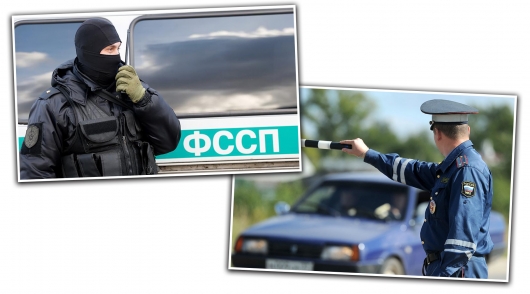As the traffic police will catch debtors on the road
The police begin to contribute to the police officers on the road new

Today entered into force a new procedure to search for debtors by bailiffs. Now under the new rules bailiffs must help law-enforcement agencies to find debtors. So, now the state authorities on request of the Federal bailiff service, or, if the basis of judicial bailiffs information about debtors are required to stop a vehicle belonging to the debtor.
A new joint order of the Ministry of Justice and Ministry of internal Affairs of the Russian Federation “On approval of the Procedure for the provision by employees of internal Affairs bodies, facilitating judicial police officers-executors in the enforcement proceedings, including in the implementation of search of the debtor’s property or search for the child, as well as in the search on the basis of a judicial act on a civil case of a citizen-defendant” requires the interaction of bailiffs and the Ministry of interior not only to search for debtors, but also to search their property. For example, MIA needs today to help the FSSP to identify debtors and the ownership of the transport driving where they sit.
We will remind that earlier the traffic police authorities were also obliged to help the police officers. But for that to this day the bailiff had to make a special resolution and request. In the end, the traffic police on the road is rarely engaged in the search of debtors. Also sometimes conducted joint raids by the FSSP and the traffic police. But it’s a drop in the bucket compared to the number of people currently wanted by the marshals.
Now everything is changing. The traffic police are obliged (Yes, Yes it is required) to self-identify debtors on the road if in respect of them in the FSSP database is the record of enforcement proceedings.
So, the traffic police have to stop the debtor and not only to please him about the existence of the debt, but also to establish his place of residence. DPS should try to find out all the information about the debtor (up to address car Parking). Then this information must be passed to the bailiffs.
The main task for the traffic police is not only the search of debtors, but also the search for owned vehicles. It is no secret that many debtors hiding from bailiffs over the years not paying debts and hiding from the FSSP their cars, fearing for their arrest.
Unfortunately, the measure to limit registration in the traffic police on the initiative of the FSSP is not as effective. Well, not the debtor will be able to re-register the car in another name (for example, the sale). But the debtor can still use the car, as do many drivers, hiding from the bailiffs.
So very soon we will learn how to work the new form of cooperation between the two bodies. And we have no doubt that traffic police will help bailiffs to find a lot of debtors. To make it especially easy today, when the country roads are covered with cameras. So they will help the traffic police authorities to break through on the basis of who owns the vehicle, and using the interagency electronic interaction to check if listed in their owners any debt or wanted by the owner of the FSSP.
You think this rampant tracing debtors only applies to car owners? In fact, the new order of the Ministry of justice in respect of all the debtors. Including pedestrians. The fact is that now all units of the Ministry are obliged to help police officers search for debtors and identify their property. So now even the usual crew of PPS during the verification of documents at the pedestrian to punch him in the FSSP database.
By the way, the police now have to help the bailiffs with the eviction of the debtor from the premises, seizure of other property, the demolition of illegal constructions / buildings according to the court, etc.
Including under the new rules, the interior Ministry and the bailiff service have the obligation to exchange information with the electronic system of interdepartmental interaction in the presence of technical possibilities. In regions or localities where it is impossible interaction of police officers with the interior Ministry will be done the old fashioned way – on paper (sending of documents by mail).
Recall that at the moment passed to bailiffs debt is 2 trillion rubles. Moreover, these debts only relate to the debt of individuals to banks. According to the FSSP at the moment our database of enforcement proceedings is 5.6 million Executive manufactures on debts of citizens before credit institutions. Moreover, as noted in FSSP this year compared to last year, the number of enforcement proceedings has increased by 1 million
Also the growing debts of Russians and traffic fines and TMS. A lot of debts and child support, the total amount of which also increases exponentially.
